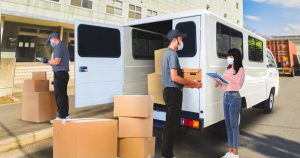
All over the world, the COVID-19 pandemic continues to disrupt day-to-day operations. In many places, healthcare institutions find it difficult to address all the active cases in their area. Furthermore, there have been reports of a new strain of the virus present in different parts of the globe. Thus, it can be said that there is still a lot of work to be done before we can finally get over this pandemic.
In an effort to reduce the spread of the virus, many governments around the world implement a form of lockdown regulation to restrict the movement of people and to keep them from congregating in a certain area. On top of that, there are social distancing protocols in place that dictate the minimum distance between two people in a given environment.
Besides the lockdown protocols, malls and shopping centers operate at reduced capacity in order to prevent an outbreak among people who visit these areas. Construction operations have been halted for a time during the period of heightened lockdown restrictions or the Enhanced Community Quarantine (ECQ). Schools and educational institutions have adopted an online learning scheme wherein classes are held over Zoom or Google meets. Other industries, such as the Business Process Outsourcing (BPO) sector have adopted a work from home setup. In this scenario, agents are supplied with the necessary office equipment such as laptops and monitors to continue their daily work from the safety and comfort of their home. In this way, they can continue serving their international clients with minimal exposure to the virus.
As mentioned above, numerous industries in the Philippines have been greatly affected by the COVID-19 pandemic. This means that the way they do business has to be changed since they have to take into account the various social distancing protocols set by the government. In light of these situations, it is important to consider how logistics companies play a pivotal role because of how they help these industries survive during the pandemic.
How Do Various Industries Use Logistics Companies?
Logistics companies have always been a great help to many industries even before the pandemic. From a simple household to an FMCG (Fast Moving Consumer Goods) company, everyone would need to use a delivery app at some point, whether it is in transporting food or hauling heavy cargo from Luzon to Mindanao. When a business wants to scale up and reach more customers, they often resort to using freight forwarders that can do long-distance deliveries. These logistics providers provide the on-demand service that they need when it comes to launching a new showroom or a new product. We can already see how crucial these logistics companies are when it comes to supporting the operations of a business.
During these moments of lockdown restrictions, the importance of these cargo and delivery companies has been greatly magnified. From food deliveries to hauling construction equipment, we will explore how each industry utilizes logistics and app-based delivery services to continue delivering to their customers during the pandemic.
In the section below, we will explore how these logistics companies provide help and support to these industries, especially during the lockdown periods.
Business Process Outsourcing (BPO) Industry
The BPO industry is one of the primary contributors to the GDP of the Philippines. In fact, a statement from the Bangko Sentral ng Pilipinas (BSP) said that it is highly likely that the BPO sector will overtake OFW (Overseas Filipino Workers) remittances in a few years in terms of their contribution to the economy. Furthermore, this sector is a major employer in the country, providing jobs to over a million people.
With the advent of COVID-19, many companies all over the country started adopting a work from home setup in order to continue operations and at the same time minimize the risk of an outbreak. The BPO sector was one of many industries affected by this sudden shift in work setup. Managers of these BPO companies suddenly face a challenging question which is how to continue productivity amidst the new work from home setup? And the solution is quite simple, use on-demand delivery app services to transport office equipment from the office to the home of the agent. By doing so, the BPO company does not have to worry about delivering and retrieving office equipment to hundreds of agents. Instead, it can just use the on-demand logistics providers to do the heavy lifting.
Restaurants and Food Establishments
We all know that many restaurants thrive because of dine-in customers. In fact, the common mentality prevalent among Filipinos is that they go to a restaurant to celebrate something special, either a birthday, anniversary or simply a get-together with relatives and friends from abroad. Thus, we can say that restaurants and other similar food establishments thrive because of their dine-in service.
With the onset of lockdown restrictions, the dine-in services of restaurants have been temporarily halted or allowed to operate at minimum capacity. Because of this, restaurant owners have to look for other ways and means to bring their menu to the tables of customers at home. And the solution to this problem is to use logistics providers with the capability to do food delivery service properly at any time of the day. Although motorbikes are the usual vehicle used in food delivery services, it is not capable of moving big loads in one go. Thus, it is recommended that a restaurant uses a sedan as an alternative to a motorbike when it comes to doing a delicate logistics operation such as a food delivery service.
Ecommerce Companies
The ecommerce industry in the Philippines is a rapidly growing one. Because of the many conveniences that it provides, such as shopping from the comfort of your home and having same-day or next-day delivery options, many Filipinos both young and the young at heart have switched to this method of buying items. In fact, an article from BusinessWorld predicts that by 2025, sales turnover from ecommerce platforms could hit USD 12 billion compared to just USD 500 million in 2015. This goes to show that ecommerce is an important industry in the Philippines and the next big disruptor in the retail landscape.
During the lockdown restrictions, with malls and shopping centers either closed or operating at minimum capacity, the importance of ecommerce companies has been greatly magnified. However, it is difficult for an online retail company to fulfill all of the delivery requirements on its own. As more and more consumers shift to online shopping platforms, ecommerce logistics operations are very important. After all, the only way to retain customers is by meeting their demands of prompt and secure delivery service. This only highlights the importance of ecommerce logistics in the day-to-day operations of these online retailers. They need to use the leading ecommerce logistics companies in the Philippines to be able to fulfill all delivery requirements and keep customers happy.
Logistics companies carry out this service without interruption even during the pandemic. They are very much capable of handling last-mile deliveries and move heavy goods across the different island groups of the Philippines.
Construction Industry
Currently, there are many construction projects all over the country in an effort to build more public infrastructure that would connect the different cities of the Philippines and thus make trade and commercial activities easy. Furthermore, many sectors such as the agriculture industry depend on these roads and public highways to transport products from farm to market or to other places in the Philippines.
However, with the pandemic restricting movement in many places in the country, it is difficult to carry out in full capacity the ongoing infrastructure projects. Thus, many construction companies had to temporarily shut down ongoing projects in order to adhere to lockdown restrictions in place. But as the economy is slowly opening up and restrictions on movement are easing, construction projects are beginning to resume operations.
Logistics companies provide on-demand delivery services which means that they can just use a delivery truck when they need to. In that way, they do not need to worry about paying a monthly fee and maintaining a minimum number of deliveries. All they have to do is use a logistics app and book their desired vehicle of choice such as a pickup truck or a mini dump truck. These vehicles are ideal for moving construction items and hauling aggregates like gravel and sand. In that way, they only need to pay for the service that they use and not have to worry about monthly dues and maintaining balances.
SEE ALSO:
- The Role of Logistics in Supporting Local Businesses
- The Logistics of COVID-19 Vaccination
- Top B2B Logistics Companies: LF Logistics, F2, Transportify, Infinity, Ernest
Conclusion
The pandemic continues to disrupt the usual way businesses operate. From the typical office setup, businesses have to adapt to a work from home environment. From the usual heavy foot traffic in malls and shopping centers, consumers have shifted to online shopping platforms. From the usual dine-in operations in restaurants, most people prefer to take out their food and eat at home to minimize the risk of infections. And from undisrupted construction work, contractors have to take into account that not all workers can report due to restrictions in movement.
In all these situations, it is evident that for a business to thrive in these times, it needs to innovate and adapt. Fortunately, logistics companies make it easier for these businesses to adapt and operate amidst the social distancing protocols set by the government. Through the services provided by these logistics companies, businesses can continue their day-to-day operations.
Frequently Asked Questions:
What logistics companies are capable of doing business trucking services?
In the Philippines, there are many logistics companies that can provide business trucking operations. Among them are Transportify, LF Logistics, F2 Logistics, Infinity Logistics Philippines, and Ernest Logistics Corporation. These companies are known to transport heavy and bulky cargo to different locations in the Philippines.
Why are ecommerce logistics operations important?
Most consumers today expect that their purchased products arrive on time and in good condition which is why it is necessary that the logistics operation of an online retail company is well established. Thus, ecommerce logistics operations are important for the smooth distribution of goods and to maintain customer satisfaction.
What is the right vehicle to use for food delivery services?
Although motorbikes are the common vehicles used in delivering food items, they can not handle bulky deliveries. That is why it is highly recommended to use sedans for food delivery services since they are capable of transporting bulk items and offer better protection against the elements.
